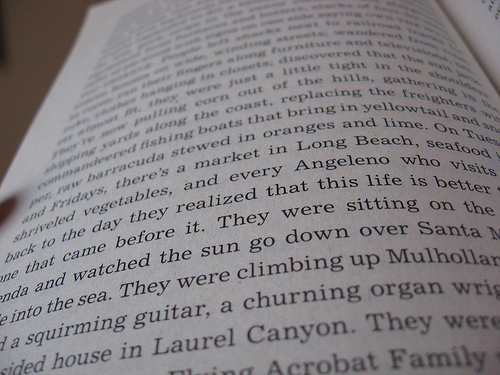 |
| Photo credit | Flickr: guy schmidt |
If you've ever taken a writing course, you've heard that you need to always use the active voice, not passive voice. Is passive voice really so bad that we should strike it from all our writing?
No, not all, but the passive voice is, well, weaker (in many instances) than the active voice. Active certainly brings the reader into the story. But, in my experience, a writer can get into caught up in a scene and write in passive voice until the characters are no longer actively participating. Sure, we can all be lulled into a rhythm of using the passive voice and its hard to snap out of it.
That's where I entered this passive-voice manuscript, knowing that some passive voice is acceptable, but too much can wear down the reader. I was only being asked to tweak the author's use of passive voice. So, I tried a approach you may want to try. On a second reading, I used the "Find" function of Microsoft Word and went to work.I spent several hours massaging a manuscript to use a more active voice.
I searched for the trigger words you might look for when rooting out the passive voice. Those words include:
- be
- was
- have
- had, and so forth...
After I found the words that screamed PASSIVE VOICE, I read (and re-read) the sections. Then I started rewriting the sections. (Another common word in many passive sentences is "by." You may find that an easier word to search for.)
If you are wondering how much passive voice I cut, this may interest you. During a search of the manuscript, I found 1191 instances of "was" and after my second-pass edits, there were only 547 instances of the word.
Are you a passive voice or active voice writer? Or both? How do you find and edit your passive voice?
Elizabeth King Humphrey is a writer and editor. She strives to be more active, but right now is feeling a bit passive.
7 Comments on Passive Sh-massive, last added: 4/8/2013
Display Comments
Add a Comment



I probably use passive voice too much. I write memoir, though, and when writing about the past it's difficult to NOT use "was" and "had". Great article!
Becky:
You don't. :) I checked yours for this. :) HA! And using was sometimes is fine.
Elizabeth: GREAT ARTICLE. I love your idea for searching those words and reading those sections they come up in over to see what you think about your own passive-voice use. Thanks for sharing how you cut the "was" use in half, too. Strong verbs are so important. We are going to have an article in the upcoming issue (NEW ISSUE LIVE VERY SOON!) where one of the writers tackles passive voice using some Word tools, too. Very interesting!
This is definitely an area in which I need to be more actively aware. I have Jessica Bell's book (--> over there in margin) on my to-buy list just for just this reason. Thanks for the reminder.
Great reminder to keep our voice active. I like the idea of searching for specific words that can tip us off to excessive passivity in our writing. Oddly, when I was in fourth grade, I had to memorize the entire litany of passive verbs and can recite them to this day—is, am, are, was, were, be, been, being, have, has, had, should, would, could, shall, will, can, may, might, must, do, did, does. Whew! Clearly, the future writer in me knew they would come in handy one day, even if it was to help me avoid them!
This is totally off topic, but I've been to the Long Beach farmer's market they are talking about in that little photo! I actually go there all the time. LOL!
Wonderful post, Elizabeth! That is so interesting how you search for passive sentences with Word's Find function. I'm a constant passive sentence checker and have a bad habit of using Word's Readability tools after I write a paragraph. But your idea of using Find for certain words is probably a more accurate and thorough edit of these offenders.
I second Margo's comment about the issue. It's fantastic, and can't wait until it publishes. The revision and self-editing techniques in the issue are ones that I'm looking forward to trying for my WIP. We had a blast, too! Margo did a wonderful job editing, and I had so much fun with the artwork. Some of the headers I created for the issue are among my faves.
Revisiting this topic is always helpful to me, so I'll definitely take a look at the WOW article!
Since I teach English & Journalism, I remind students to use active voice, but sometimes, passive voice has its place, primarily when the "actor" in a sentence is unknown or unimportant (Example: The Internet was establishined in 1969 by the US Department of Defense).
Another phrase to search for with the find function: there is or there are. These phrases raise red flags, signaling "passive voice resides in this sentence!!"